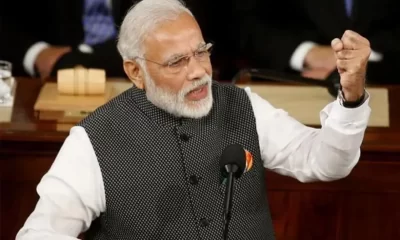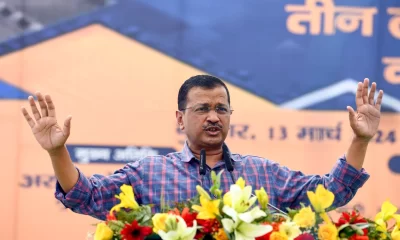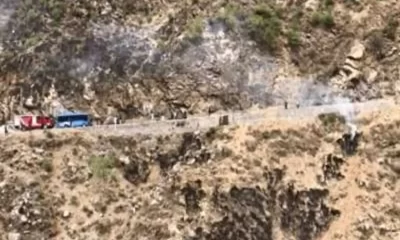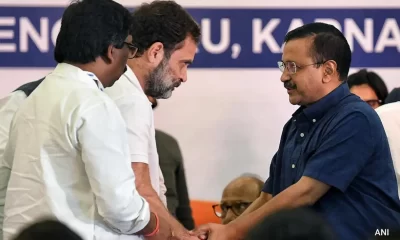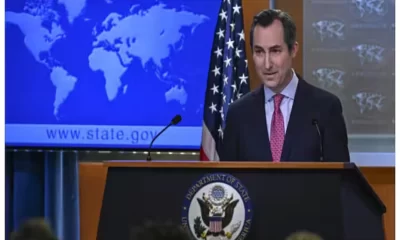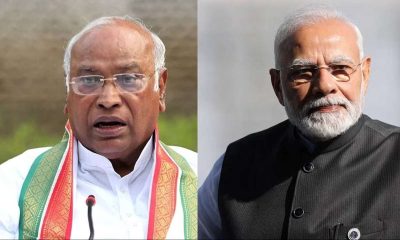Latest world news
Trump Wants India to Help More in Afghanistan

[vc_row][vc_column][vc_column_text]Criticize Pakistan for harboring terrorists
US President Donald Trump has appreciated India’s contribution to stability in Afghanistan and desired that New Delhi should extend more economic assistance for pursuing “shared objectives” for peace and security in South Asia and broader “Indo-Pacific region.”
While addressing the nation on new US strategy on Afghanistan on Monday evening, Trump referred to India saying “Another part of the South Asia strategy for America is to further develop its strategic partnership with India—the world’s largest democracy and a key security and economic partner of the US.”
He further said “We appreciate India’s important contributions to stability in Afghanistan, but India makes billions of dollars in trade with the US, and we want them to help us more with Afghanistan, especially in the area of economic assistance and development. We are committed to pursuing our shared objectives for peace and security in South Asia and the broader Indo-Pacific region.”
While referring to Washington’s new approach towards Pakistan, President Trump said that our new strategy is to change approach on how to deal with Pakistan. He said, “We can no longer be silent about Pakistan’s safe havens for terrorist organizations, the Taliban, and other groups that pose a threat to the region and beyond. Pakistan has much to gain from partnering with our effort in Afghanistan. It has much to lose by continuing to harbor criminals and terrorists.”
Further elaborating his opinion on Pakistan, Trump said, “We have been paying Pakistan billions and billions of dollars at the same time they are housing the very terrorists that we are fighting. But that will have to change, and that will change immediately.” He further said that, “No partnership can survive a country’s harboring of militants and terrorists who target U.S. service members and officials. It is time for Pakistan to demonstrate its commitment to civilization, order, and to peace,” he said.
President Trump said that “American people are weary of (Afghanistan) war without victory—the longest war in American history—17 years. I share the American people’s frustration.” After studying “in great detail” and several meetings “over many months” I have arrived at “three fundamental conclusions.”
Describing his administration’s conclusions, President said that our nation must seek an honorable and enduring outcome with an aim of fight to achieve victory, avoid hasty withdrawal by not repeating the mistakes committed in Iraq, and face the immense security threats posed by “20 US designated foreign terrorist organizations which are active in Afghanistan and Pakistan.”
He prescribed the three point solution for Afghanistan crisis. The policy shift suggested by the President Donald Trump included “shift from time based approach to one based on conditions.” He said that there would be “No talk about numbers of the troops or our plans for further military activities. Conditions on the ground—not arbitrary timetables—will guide our strategy from now on.”
He also suggested “integration of all institutions of American power—diplomatic, economic and military—toward a successful outcome” in Afghanistan.
However, Trump indicated of possible political settlement “that includes elements of the Taliban in Afghanistan, but nobody knows if or when that will ever happen.” He also indicated that US was working on a limited agenda saying, “We are not nation building again. We are killing terrorists.”
Washington had, during Barak Obama administration, suggested peace talks with Taliban for resolving the crisis. Their representative office was set up in Doha, the capital of Qatar. However, the proposal was suddenly dropped because of some diplomatic reservations.
President Trump said, “Ultimately, it is up to the people of Afghanistan to take ownership of their future, to govern their society, and to achieve an everlasting peace. We are a partner and a friend, but we will not dictate to the Afghan people how to live, or how to govern their own complex society.”
Moreover Trump favored to extend more decision making power to the commanders on the ground. He argued to “expand authority for American armed forces to target the terrorist and criminal networks that sow violence and chaos throughout Afghanistan.” He said “Micromanagement from Washington, D.C. does not win battles.”
US president summed up his Afghan policy saying, “From now on, victory will have a clear definition: attacking our enemies, obliterating ISIS, crushing al Qaeda, preventing the Taliban from taking over Afghanistan, and stopping mass terror attacks against America before they emerge.”
However, some of his observations were driven by his political compulsions. He observed that “9/11, the worst terrorist attack in our history, was planned and directed from Afghanistan because that country was ruled by a (Taliban) government that gave comfort and shelter to terrorists. A hasty withdrawal would create a vacuum that terrorists, including ISIS and al-Qaeda, would instantly fill, just as happened before September 11th.” He further said, “In 2011, America hastily and mistakenly withdrew from Iraq. As a result, our hard won gains slipped back into hands of terrorist enemies.”
Rather it would be worth to recall that Iraqi government headed by Prime Minister Nouri al-Maliki did not oblige US “by requesting to extend their stay” in that country. He had clearly said that Iraqi parliament was divided on the subject.
In fact Iraq was the first country in US military overseas interventions where they were forced to leave on the first departure schedule.
President Donald Trump also did not choose to speak about the role of Saudi Arabia and other GCC countries in spreading terrorism. He has recently visited Saudi Arabia where more than 50 heads of Arab and Muslim countries were invited. During the visit Trump had also signed $ 110 billion weapons deal with Saudi Arabia.
Recently, Mutlaq Majed al-Qahtani, the special envoy of Qatari Foreign Minister, in an opinion piece in Wall Street Journal recalled that “Fifteen of the 19 hijackers in the 9/11 attacks were Saudis. Thousands of Saudi citizens have taken up arms to join Islamic State (IS) and other radical groups.”
The Qatari diplomat also elaborated UAE’s role in supporting terrorism by saying, “Two Emiratis participated in the September 11 hijackings, and the staff report to the 9/11 Commission revealed that much of the funding for the attacks flowed through the UAE, which was a world hub for money laundering.”[/vc_column_text][/vc_column][/vc_row]
Latest world news
World Earth Day 2024: Google Doodle showcases aerial view of planet’s natural beauty
Google celebrated Earth Day 2024 with a special doodle featuring an aerial view of our planet’s biodiversity.
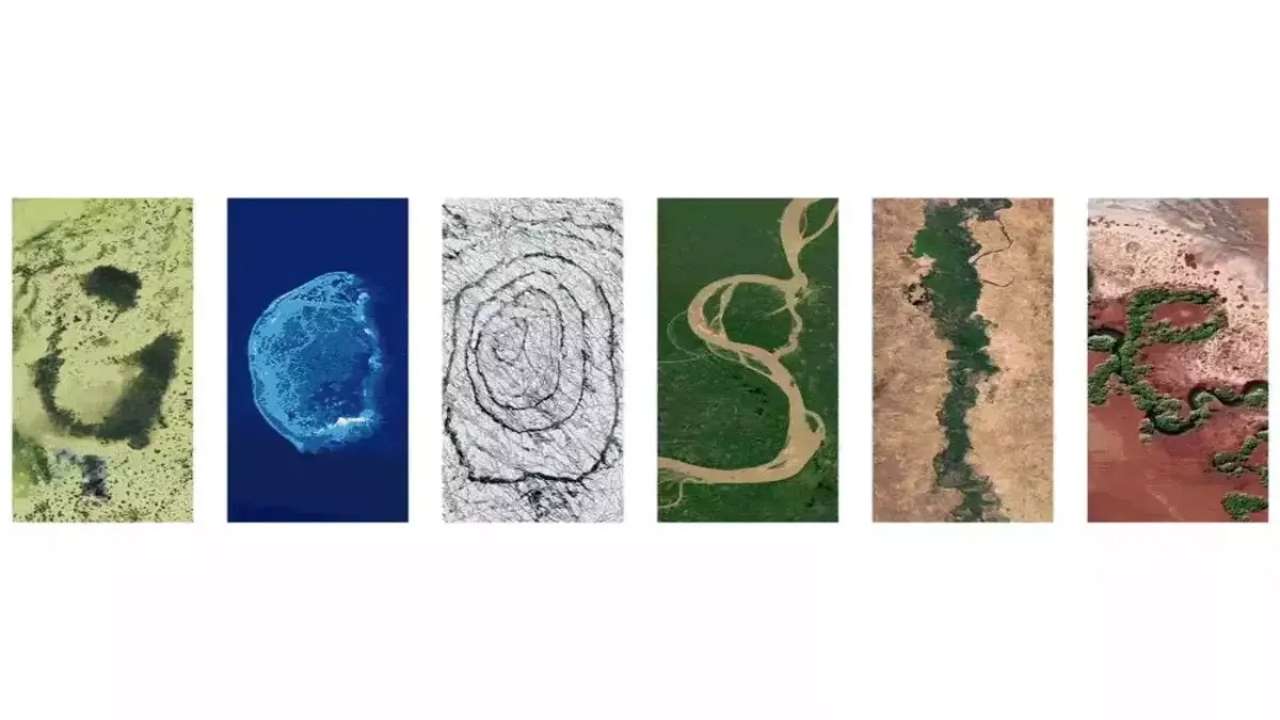
Google shared a doodle today to celebrate World Earth Day 2024, which showcased aerial photos of the planet’s biodiversity and natural beauty. Google reminded us of the importance of protecting planet earth for future generations with the help of this doodle.
The Google letters depict specific locations across the globe where people, communities, and governments work every day to help protect the planet’s natural beauty, biodiversity, and resources, according to the explanation of the annual Earth Day 2024 doodle on their website.
It said, these examples remind us that there’s much more to do to address the climate crisis and biodiversity loss, but also offer the promise of hope and optimism.
The islands of Turks and Caicos are represented by the letter “G.” The islands’ conservation efforts are concentrated on protecting important regions for biodiversity and addressing persistent environmental problems.
The largest reef in the southern Gulf of Mexico and a UNESCO biosphere reserve, Scorpion Reef National Park, is represented by the letter “O” in the Mexican flag.
The letter “O” features Iceland’s Vatnajokull National Park, which was designated as a national park in 2008 following decades of advocacy. The ecology within and surrounding the biggest glacier in Europe is safeguarded by this UNESCO World Heritage Site.
The letter “G” has the Jau National Park in Brazil on it. It is a UNESCO World Heritage Site and one of the biggest forest reserves in South America.
The Great Green Wall of Nigeria is represented by the letter “L,” and the Pilbara Islands Nature Reserves of Australia are represented by the letter “E.”
Meanwhile, Earth Day is a worldwide event that promotes protection of the environment every year. April 22 serves as a reminder of the importance of conservation efforts and sustainable practices to guarantee a healthier world and a brighter future.
The occasion inspires people across the world to come together and take action to protect the environment, strengthening our bonds with nature and promoting good change.
Latest world news
Bigg Boss 14 contestant Rahul Vaidya struggles walking in knee deep water, compares Dubai rains with Mumbai floods
Singer and TV personality Rahul Vaidya was recently stranded in the Dubai rains.

Rahul Vaidya, who was in Dubai ahead of his show which was scheduled to take place today, left the country due to heavy rains and reached Kolkata. The artist shared on social media his encounters in the UAE city, including challenges like walking through knee-deep water. Rahul provided an update regarding the heavy rainfall in Dubai on his Instagram profile.
The Bigg Boss 14 contestant revealed that he was in Kolkata and prepared to do an evening performance. Recalling the terrifying period he went through, Vaidya said there was a lot of confusion and panic in Dubai. The situation was similar to that when heavy floods hit Mumbai in 2005.
Vaiday also posted seval other images and videos of cars that were underwater and flooded roadways. The Bigg Boss 14 contestant, who shared his ordeal, claimed that even though it had just rained for two hours, the situation was dire.
In one of the video, which went viral he can be seen struggling in walking in knee-deep water. He can be also seen holding his sneakers in one hand and with other hand he was seen managing other things.
This is the result of the two hours of rain that it had, he can be heard saying in the video. Vidya also said he dosen’t believe Dubai is accustomed to a lot of rain. Everything had stopped working, he remarked.
After taking part in the first season of the singing reality show Indian Idol, Rahul Vaidya gained widespread recognition. In addition to Bigg Boss, he took part in Khatron Ke Khiladi 11.
Meanwhile, heavy rains that triggered flooding in the UAE and Bahrain, which left 18 people dead in Oman on Sunday and Monday, have paralyzed the financial hub of the Middle East, Dubai.
A lot of incoming flights were diverted from Dubai’s international airport because of the rain. At 7:26 p.m., the busiest airport in the world for foreign visitors stopped accepting new arrivals; a gradual resumption was announced for more than two hours later.
Images of planes navigating flooded tarmacs are making the rounds on social media.
According to pictures shared on social media, the flagship malls Dubai Mall and Mall of the Emirates both experienced heavy floods, while at least one Dubai Metro station had water up to the ankles.
There were several road collapses, severe flooding in residential areas, and numerous reports of leaks from windows, doors, and roofs.
Due to the unfavourable weather, schools around the United Arab Emirates were forced to close, and as more storms are predicted, the closures are anticipated to last until Wednesday. The government of Dubai allowed its staff to work remotely till this Wednesday.
Latest world news
Dubai sky turns green during storm in UAE, video goes viral
The UAE witnessed record-breaking rainfall on Tuesday and the National Centre of Meteorology recorded 254 mm of rainfall in less than 24 hrs in the Khatm Al Shakla area in Al Ain.

1 person was killed in UAE as it witnessed heavy rainfall on Tuesday, stranding commuters, flooding roads, disrupting trains and flights and resulting in water leakage from mall ceilings. The UAE witnessed record-breaking rainfall on Tuesday and the National Centre of Meteorology recorded 254 mm of rainfall in less than 24 hrs in the Khatm Al Shakla area in Al Ain. It is being said that the rainfall was the highest documented since the start of data collection in 1949.
The heavy rainfall in UAE came days after a similar situation in neighbouring Oman, where 13 people were killed in flash floods. Many parts of Oman saw torrential rains, which caused students to be trapped in buses and swept away motorists and trapped people in their homes.
Videos from Dubai circulating on social media showed widespread waterlogging on roads in Abu Dhabi, Dubai and other important cities. This left daily commuters in cars and other vehicles struggling to get back home. Dubai metro station too was seen flooded and closed.
One such video circulating on social media shows the aerial view of the city of Dubai from the top of a building. In the video the stormy winds are seen blowing over the city of Dubai. As the storm intensifies the Dubai sky turns green and ultimately gets covered by heavy rainfall. The video has gone viral on social media with more than 1.1 million views.
Another video showed water leakage from the ceilings of shopping malls, flooding the floors and destroying goods. A video which was shot in the famous Mall of the Emirates, showed pieces of ceiling falling as the rainwater gushed inside. Videos from many outlets of the Deira City Centre mall chain showed escalators being rendered unusable. Majid Al Futtaim, the company which owns the Mall of Emirates, said that the shopping complexes have been kept open and the customers are being sent away from the flooded areas.
-
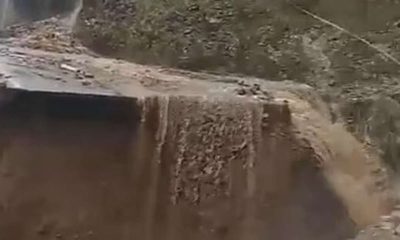
 India News8 hours ago
India News8 hours agoLandslide hits Arunachal Pradesh, highway linking Indo-China border affected
-
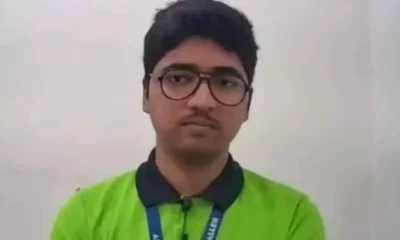
 Education6 hours ago
Education6 hours agoFarmer’s son Nilkrishna Gajare Nirmalkumar from Maharashtra scores 100 NTA score in IIT-JEE Mains 2024
-

 Entertainment7 hours ago
Entertainment7 hours agoBollywood stars Salman Khan, Alia Bhatt, Rekha, Sonakshi Sinha, Aditi Rao Hydari attend Sanjay Leela Bhansali’s Heeramandi premiere
-

 India News8 hours ago
India News8 hours agoTamannaah Bhatia summoned in illegal IPL streaming app case, to appear before cyber cell on April 29
-
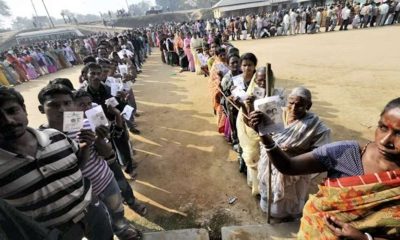
 2024 Lok Sabha Elections7 hours ago
2024 Lok Sabha Elections7 hours agoBihar: Election Commission extends voting timings for 4 Lok Sabha seats due to heatwave
-

 Cricket news8 hours ago
Cricket news8 hours agoIPL 2024: Rishabh Pant, Axar Patel score half centuries as Delhi Capitals beat Gujarat Titans by 4 runs
-
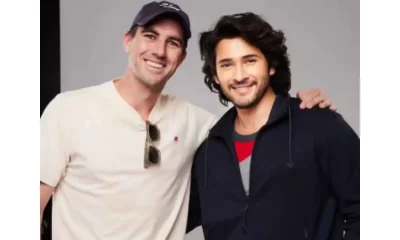
 Cricket news56 mins ago
Cricket news56 mins agoTelugu superstar Mahesh Babu meets SRH captain Pat Cummins, says it is an absolute honour
-
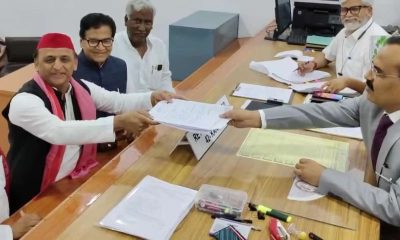
 2024 Lok Sabha Elections6 hours ago
2024 Lok Sabha Elections6 hours agoLok Sabha elections: Samajwadi Party chief Akhilesh Yadav files nomination from Kannauj

